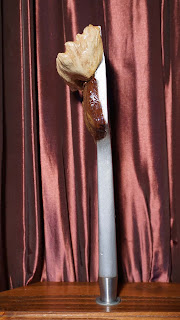Tap Handle #707: Newfoundland (Molson) - Moose Pale Ale
Tap size: 10.5" by 4" wide
Rarity: less than 10 seen, beer retired, fragile
Mounting: 3/8" ferrule on 5/16" anchor bolt
Rarity: less than 10 seen, beer retired, fragile
Mounting: 3/8" ferrule on 5/16" anchor bolt
Back in tap profile #657, I mentioned the "Bill Gibson Wing", and how much Bill had contributed to the Museum. I'm now working through the portion of the collection that contains many of the taps that he supplied me with. Several of these are early examples of resin taps that have historical value. Moose Pale Ale is one such example, with a bas relief of the head of a moose and lots of fragile antler points attached to the tap base. There are also antler points sticking out away from the tap, creating a very unique-looking piece. The words "Moose Pale Ale" are on a decal running vertically down the base. The back of the tap is flat, with no markings indicating artist or date. There are a couple of drips of clear coat that have run down and pooled on the back, but don't affect the appearance of the front. The tap is a little wider than most at 4". It is very scarce...information was very tough to come by, since the brewery was absorbed by Molson in the 1960s, and the Moose Pale Ale brand was discontinued in the late 1990s or early 2000s, not long after this tap was made. I have only ever seen one other.
Click though to read more about Newfoundland Brewing, their Moose Pale Ale, and to see more photos of this tap...
Newfoundland Brewery Limited was founded in St. John's, Newfoundland, Canada in 1893. It was built during the "reconstruction period" after a fire destroyed a large part of the town in 1892. Early brews were most likely pale ales and possibly IPAs due to a strong British influence, as Newfoundland was originally settled as a British colony. However, when Prohibition arrived in 1915, it forced the brewery into brewing "near beer", a low-alcohol English pale ale. All Newfoundland beer from the time of World War I had been brewed by English or local brewmasters, designed on the English ale system. They had no quality or standards control.
Newfoundland Brewing was one of only two of the province's breweries to survive Prohibition. When a new, third brewery came on the scene after Prohibition ended, and hired a German brewmaster to produce lagers, it sparked a fierce competition among the three breweries. This was mostly due to the fact that the population, who were tired of the watery British ales served during Prohibition, enthusiastically embraced the full-bodied lagers. The healthy competition also forced all three breweries to modernize with new equipment designed to improve quality and to better produce the German-style beers.
During World War II, people in Newfoundland began to fear the possibility of "poisoned beer" - beer poisoned by German nationalists - and with a strong push towards patriotism, German beer fell out of favor in the province. Newfoundland Brewing went back to their British roots, producing Moose Pale Ale and India Pale Ale, but these versions were much stronger than their weaker Prohibition predecessors. After the war ended, Newfoundland Brewing did branch out by producing a golden lager called India Beer, which had a Newfoundland dog on the label. They also produced a few other varieties, such as India's Holiday Bock, Red Top Golden Amber, and Irish Cream Porter.
By the 1960s, flush with cash from their success of exporting to North America, the Canadian macro breweries began to swallow up the smaller ones. In 1962, the three main Newfoundland breweries were each bought by a separate macro brewery; Molson acquired the Newfoundland Brewery, including all their brands. Over the years those brands were all phased out, except for India Beer, which is still produced today at Molson's Newfoundland Brewery, and it is only sold in the Newfoundland province, although the recipe and taste has greatly changed from that of the original brewery's version. The label, however, still features the image of a Newfoundland dog, just as it did 50-60 years ago.
Though it can't be 100% confirmed, it is believed that Newfoundland's Moose Pale Ale was discontinued in the late 1990s/early 2000s. There are no entries on Ratebeer or Beer Advocate for Newfoundland Moose Pale Ale.
Source Material

























Comments
Post a Comment